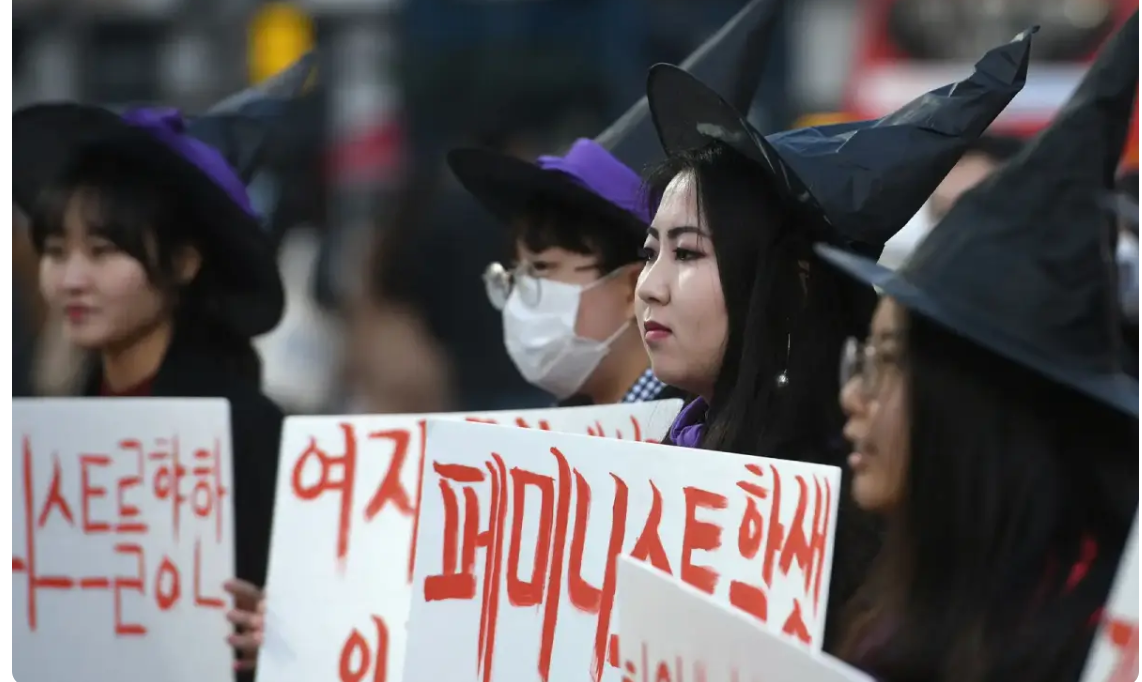In 2016, the brutal murder of a woman near a Seoul subway station sparked the birth of the 4B movement after the offender claimed he “felt ignored by women.” The horrific incident led to a national evaluation around how women are treated in the country, which included conversations around femicide, revenge porn, and digital sex crimes. According to CNN, “4B is a shorthand for the four Korean words bihon, bichulsan, biyeonae and bisekseu, which translate to no marriage, no childbirth, no dating, and no sex with men.” This movement strives to create an atmosphere where women feel accepted without following traditional relationships where men are central to their identity.
In Korea, the movement’s growth has been fueled by prevalent patriarchal structures that reinforce the traditional family structure (stay at home wife, working husband, and multiple children). Despite South Korea’s extraordinary economic success, women’s participation in the workforce still remains strained by a significant salary gap, limited promotion opportunities, and burdening social norms that still dictate a woman’s role in society. South Korea is also known for its unsubtle way of encouraging women to prioritize marriage and childbirth. In response, the 4B movement stands to reform these expectations and pursue individual independence.
This movement resonates with people in the United States, as in the days since it became clear that Donald Trump would be re-elected president, there has been a growing interest in the movement. In light of his support of restrictive policies on reproductive rights, many women in the U.S. feel that disengaging from traditional male relationships is a powerful way to assert autonomy and resist perceived misogynistic trends in government policy. Women have become increasingly vocal about gender-based injustices, emphasizing personal agency and questioning traditional relationships.
Furthermore, more and more women reveal they are enraged after the majority of their male colleagues had voted for a candidate who has been reported for sexual abuse and brought about the overturning of national abortion rights. According to Ashli Pollard, a 36-year-old woman states, “so if you’re going to hate us, then we’re going to do what we want.”
The popularity of 4B-related content has surged on social media platforms, motivated by fears that Trump’s policies might lead to dissolving women’s rights spreading the message to a broader audience. This multi-cultural adaptation highlights how Trump’s policy positions have amplified movements like 4B, as American women draw inspiration from South Korea’s example to advocate for change.
Overall, the 4B movement is more than a protest against one cause; it’s about encouraging women to live their own lives by their own terms instead of abiding by societal norms. By rejecting these expectations, 4B advocates for women to reclaim control over their lives. This is empowering in a society that still places enormous pressure on women to fulfill these roles, often at the expense of their careers and financial independence. While Trump’s policies may have triggered this movement in the United States, its true appeal lies in its vision of a world where women aren’t defined by their relationships with men but by their choices. In sum, supporting the 4B movement means supporting a future where women have the freedom to choose their paths without fear or judgment.








